From swimming pools to solar panels – future of the home in turbulent times
After decades of economic growth, low inflation and low interest rates, homeowners had become accustomed to living in a world where credit was cheap and property prices kept rising. Suddenly, the 2020s forced society to leave this fantasy world and deal with reality. This reality not only includes economic deterioration, but also looming security threats from both foreign powers and climate change that may alter how homeowners view their precious homes.
To find out how these turbulent times are affecting homeowners, we conducted a survey on behalf of Inwido among more than 3,300 homeowners in Sweden, Norway, Denmark, Finland and England. The responses were collected in October 2022, revealing interesting insights into homeowners' attitudes towards their homes considering the economic downturn. In this article, we will delve into four key findings from the survey.
The Foundation of Home Consumer Values Is Solid
Homeowners' attitudes toward their homes have proven surprisingly stable over the past decade, seemingly unaffected by what happens in the world around them. Even during periods of war and high inflation, homeowners' valuations of their homes remain consistent.
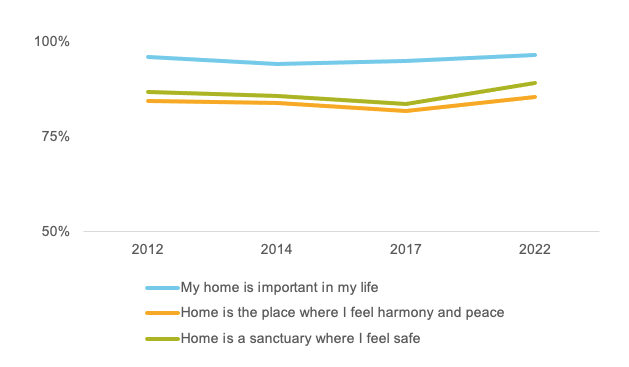
Share of homeowners who agree with the statements above.
The fact that the home is important is one of the few things in life that almost everyone seems to agree on, with 96% of homeowners agreeing in 2022. Similarly, most homeowners agree that the home is a sanctuary that gives them a sense of security and peace. 77% see home improvements and purchases as a worthwhile investment, up slightly from 2017. If anything, the turmoil of the past few years has made us appreciate our homes even more.
Home Spending Shifts from Self-Fulfillment to Return on Investment
While homeowners' appreciation of their homes remains strong, most homeowners cannot ignore the reality of a deteriorating economic climate. The survey shows that homeowners plan to reduce their overall level of consumption over the next five years.
This means that some homeowners' renovation plans have been put on hold. 14% believe they will undertake a major renovation in the coming year, down from 22% when we asked the same question in 2014. However, most respondents still believe they will renovate within the next five years. Many will take matters into their own hands, as 58% say they prefer to do home improvements themselves to save money.
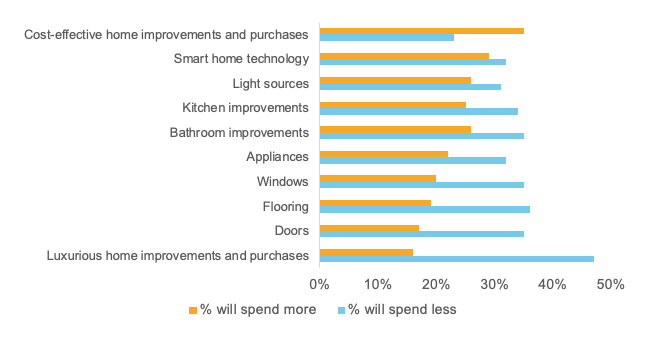
Share of homeowners who believe they will increase/decrease their spending within different home categories during the coming 5 years, compared to the past 5 years.
Looking closer at expected spending on home improvements and purchases, splurging on swimming pools and patios is a thing of the past, as homeowners plan to make drastic cuts in luxurious home spending during the coming years. Rather than cutting all home-related spending, homeowners are ready to reallocate it, largely towards measures that can generate some return on investment.
Demand for Home Energy Solutions Explodes in a Perfect Storm
One way to make cost-effective home improvements is to make your home more energy efficient, and homeowners are well aware of this. Skyrocketing energy prices have made energy-efficient homes more attractive than ever, as 81% would find it valuable if their home became more energy efficient.
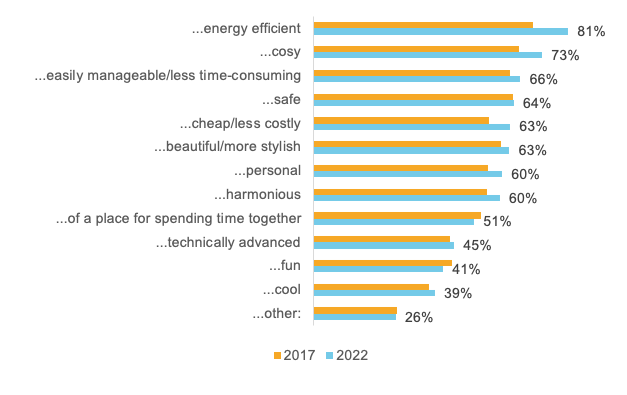
Share of homeowners who believe it would be valuable if their home became more…
The shifting energy prices are even affecting some homeowners' well-being, with 60% agreeing that they are very anxious about rising energy costs. Almost 1 in 3 homeowners state that they check the energy price basically every day, while 23% consider their own interest in their home’s energy consumption to start looking obsessive.
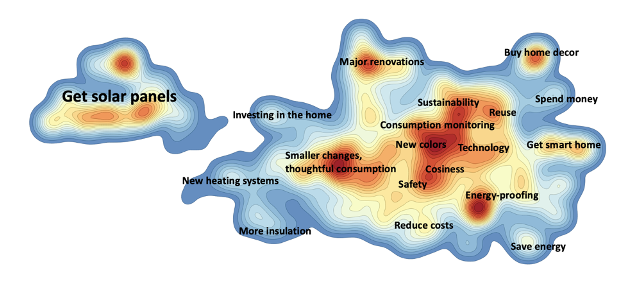
Overview of how homeowners plan to act on the home-related trends they see among their friends and acquaintances, open-ended survey responses. Bigger and more deep red clusters indicate more answers within each topic.
With this in mind, it is not surprising that installing solar panels stands out when we ask which home-related trends homeowners are planning to act on. 40% of homeowners expect their homes to be equipped with solar panels in ten years’ time, which would be an impressive five-fold increase compared to the 8% whose homes have solar panels today.
From Obsessive Control to Outsourced Decisions
With the vast amount of data being collected by the devices around us, we have the potential to make more informed decisions than ever before. The survey results show that homeowners are looking for more ways to monitor their spending and maintain a sense of control over their homes. Today, apps are doing a good job of simplifying this. In addition, new tools are entering the market that will allow the future home consumer to be in control with even less effort.
With the rapid development of new generative AI models, readily available to the public since the release of ChatGPT, it is becoming possible to have such models assist and eventually take over decision-making in and about the home. Even before the release of ChatGPT, 1 in 3 Millennial- and Gen Z-homeowners were open to letting AI make decisions about their homes.
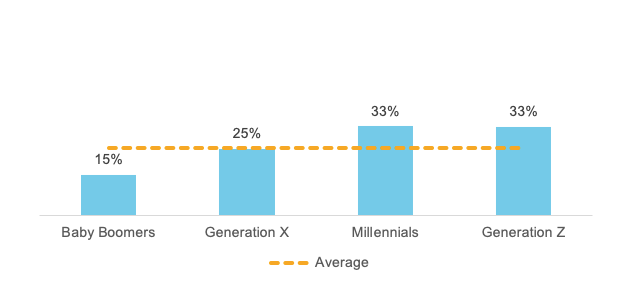
Share of homeowners from different generations who are open to let AI make decisions about their homes. NOTE: The question was asked before the general release of ChatGPT.
A lot has happened in the short time since then. Today, generative language models like ChatGPT can answer any home-related question. The even newer GPT-4 takes this a step further, offering ideas on home improvements based on uploaded images of a home or supporting the decision what to cook for dinner using a picture of the contents in your fridge. Meanwhile, image generators like Midjourney can be used for illustrating how a potential home improvement would turn out.
The integration of the new generative AI technology into smart gadgets, combined with the new smart home industry standard Matter, which allows devices from different brands to work together, means that there is huge potential for the smart home to finally live up to its name. This way, decision-making in the home can become better and more effortless than ever. According to young homeowners, they are ready to be the first movers.
Would you like to understand more about how current trends are affecting consumer behavior in your industry? Contact Peter Pernemalm to learn more about how we can help your organization.
